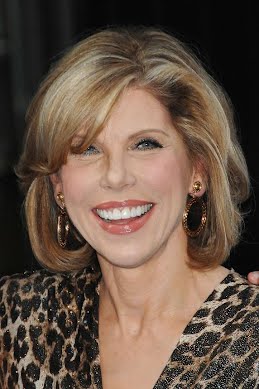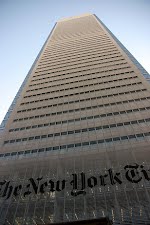On great clothes and funny lines

“I attribute the longevity of my career to the fact I didn’t have to carry that [sex symbol] mantle. I was never beautiful so I’m not unbeautiful. I may not have been a leading lady, but I had great clothes and funny lines. I think I had more flexibility.”
-Christine Baranski in the NYT's new monthly feature, "Main Course"
I've always loved the simple, direct, yet sensitive writing of the NYT's fashion journalist Cathy Horyn (think Steve Jobs' memos, but on the topic of runway fashion rather than consumer technology.) But I haven't read as much of her as I'd like, since her beat often isn't of very much interest to me.
Sure, I like to read a monthly women's fashion magazine or two (Elle is my favorite), but that's more for the pop culture than for the clothing spreads. I'm not interested in keeping up with the constant treadmill of multi-city, multi-season "fashion weeks" that Cathy Horyn writes about for a living.
That's why I was happy to see that the Times has given Horyn a new monthly column called "Main Course," which is billed as "a conversation over lunch with a notable public figure." For the column's debut, Horyn sat down with the actress Christine Baranski at storied Manhattan media power lunch spot Michael's (Horyn notes that during their lunch Barbara Walters was naturally sitting one table away, and, just as naturally, Baranski didn't notice.) Needless to say, I thought the whole article was fantastic.
P.S. Although I'd beg to differ on Baranski's assertion that she's not beautiful, I get what she's trying to say. I'd take great clothes and funny lines over youthful sex symbol status any day.
On linking in, and out
"The artifacts of our past accomplishments can become so engrossing in digital form that it can be harder to notice all we don't know and all we haven't done. While technology has generally been the engine that propels us into unknowable changes, it might now lull us into hypnotic complacency."
-from a NYT Magazine article by Jaron Lanier (also recommended: his book "You Are Not a Gadget")
I've been putting off adding my new venture to my LinkedIn profile. It might be because Ookoo Media is still in its initial stages, but that doesn't quite make sense-- I've been working on it since May, and have finished products for very satisfied clients. And I can't pretend that I forgot about my LinkedIn profile after I quit my job.
Lanier's comment made me realize I may be neglecting to update LinkedIn because what I'm doing now is a relatively big departure from the other things on my resume. I'm nervous about how my foray into "unknowable changes" might be received by my existing "network."
Now that I've put it in writing, it sounds ridiculous, but then again so many of the fears that hold us back actually are.
Media parties and the vodka fizz

A lot of what New York Times reporter David Carr says in this interview about the state of the media is so true it's kind of sad. I saw some of the extravagance he mentions in my first amazing journalism gig in New York (at a magazine which has, incidentally, since folded.) I remember consciously trying to savor every fancy dinner, town car and nice hotel room, since for me, an entry-level 20-year-old, it all didn't really make sense.
But even when you know deep down that something is too good to be true, it's still upsetting when the inevitable end comes. It's starting to set in that the past 15 years have been an unsustainable anomaly for not just finance, but a lot of other industries too.
A particularly relevant excerpt of Carr's real talk:
"I think one thing that people do not understand is, as recently as four or five years ago, to be a member of Manhattan media, you weren't rich, but you lived as a rich person might. You went to the parties that a rich person would go to, you ate the food that a rich person would eat, you drank the vodka that a rich person would drink, and you'd end up in black cars, and you'd end up sometimes on boats and in helicopters.
"We lived as kings, and it convinced us, I think, that there was a significant underlying value to what we did. And I think we're finding out now that the real, actual value of journalism in the current economy is not that high."